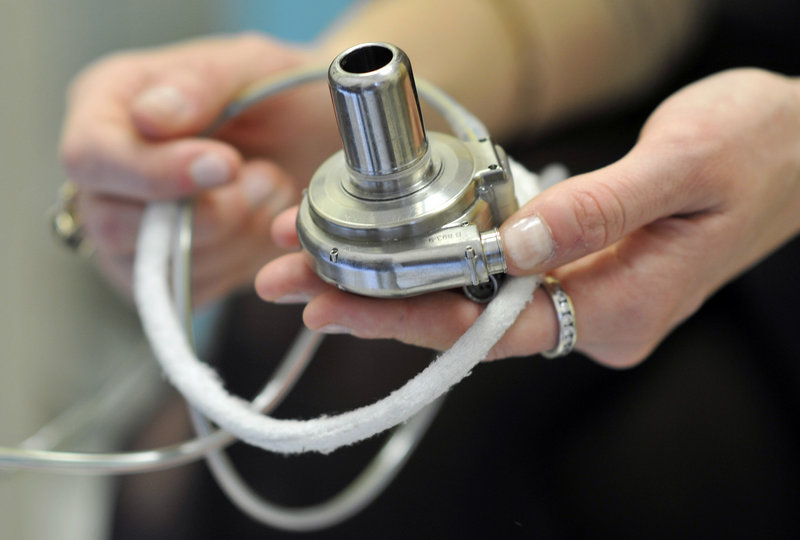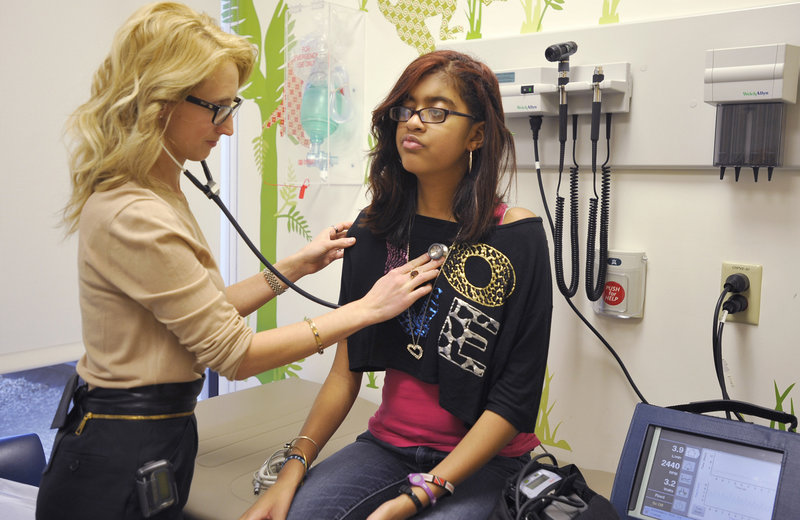YARMOUTH, Mass. – Thirteen-year-old Kyah DeSimone wanted to make cheerleading practice and good grades, not medical history.
But after a frightening brush with heart failure, the eighth-grader became the first patient at Boston Children’s Hospital to be implanted with a heart pump small and portable enough to restore her to normal life while she waits for a transplant.
After February school break, she was back in class part time at Dennis-Yarmouth Regional High School – making her the first child in the United States to return to school after having a heart pump implanted, officials at Children’s Hospital said.
Kyah eventually should be able to attend high school full time as well as resume cheerleading and hip-hop dance lessons, said Dr. Christina VanderPluym, cardiologist at Children’s Hospital.
“We actually encourage them to be as active as possible,” she said.
There are some limitations.
Kyah can’t go swimming or do chores that cause electrical static – such as vacuuming – as long as the titanium golf-ball-sized pump is plugged into her left ventricle, VanderPluym said.
“Other than that, she can do anything,” she said.
“It is keeping her going until she can get a heart” transplant, Kyah’s mother, Danielle DeSimone, said.
Kyah has cardiomyopathy, or disease of the heart muscle, as a result of a rare genetic condition, and she was undergoing tests every six months as a precaution.
But Kyah ended up in the emergency room of Cape Cod Hospital in early October after she experienced trouble breathing and excessive thirstiness.
“She had just been at my house,” Kyah’s best friend, Tarah Mendes, 14, said.
“All of a sudden she was really, really sick.”
Diagnosed with heart failure, Kyah was taken by ambulance to Children’s Hospital, where doctors gave her medicine to try to combat the weakening of her left ventricle.
After a month in the hospital, however, Kyah’s right ventricle also went into failure.
“She was so ill,” said VanderPluym, who first met Kyah a few days before the surgery.
Already thin, Kyah lost about 20 pounds and vomited for half an hour after having a cup of water because the heart condition wouldn’t allow her digestive system to work, VanderPluym said.
“She could barely even speak,” her mother said. “They told me they’d be surprised if she made it through the night. She was actively dying.”
The only option in lieu of a heart transplant – which could mean a wait of months or years – was to put Kyah on a motorized centrifugal pump that would suck blood from her left ventricle through a tube into her aorta – performing the function of her heart for her.
Until that point the device used by Children’s Hospital was the Berlin Heart, a clear plastic pump worn outside the body and attached to a heavy computer console.
“You can’t go upstairs with it. You can’t go to school with it,” VanderPluym said. “Really it was our only device for children” awaiting heart transplant.
The HeartWare implantable device had been approved for several years in the cardiologist’s native Canada, but it didn’t receive the Food and Drug Administration OK for adult use until Nov. 20 – nine days after Kyah’s surgery.
Convinced the HeartWare pump would be the best option for Kyah, VanderPluym filled out a 26-page request for emergency FDA approval for a pediatric patient during the Veterans Day weekend.
By 10 a.m. Nov. 11, Children’s Hospital had the approval, and Dr. Francis Fynn-Thompson of Children’s Hospital and Dr. Duc Thinh Pham of Tufts Medical Center, who had experience with the device, were scrubbed and ready to operate.
“It was a big team effort,” VanderPluym said. After a three-hour surgery, the device’s rotarized pump not only had succeeded in pushing blood through the left ventricle but also had relieved the stress on the right ventricle so it was functioning again.
And the team effort didn’t stop in the OR – VanderPluym and Children’s Hospital cardiology nurse coordinator Beth Millian traveled to Yarmouth to educate police, fire and school officials as well as members of a local nursing team about Kyah’s heart device.
The continuous flow of the pump means the child doesn’t have a regular pulse, so emergency officials needed to know they don’t need to start CPR if Kyah is conscious, VanderPluym said.
First responders came up with a plan to transport Kyah to Cape Cod Hospital in the event of a power failure – which they did during the February blizzard.
VanderPluym also met with students in Kyah’s STEM (science, technology, math and engineering) class and let them handle a model of the HeartWare device.
It’s important to dispel mystique around the device, she said.
“I was kind of embarrassed and nervous, but it was fine afterward,” Kyah said.
She wears the black bag that carries the device’s controller and battery over her shoulder like a purse.
The wire that powers the ventricular assist device goes from the controller, about the size of a cable box, into her body through a hole in her abdomen.
At night the device is plugged into an electrical socket to save the juice in the batteries. And day or night Kyah makes sure her little brother, 6-year-old Jaedan, doesn’t accidentally yank the device’s drive line out.
“Kyah honestly amazed us at how quickly she picked it up,” Millian said. “She wanted to learn.”
Even when her daughter was deathly ill, she was determined to get better, Danielle DeSimone said. “She kept telling me to ‘think positive, mom.”‘
“I just felt like God has plans for you,” Kyah said. “I don’t really remember a lot of things. But I felt like I would be OK.”
Carrying around the device sometimes “feels weird,” Kyah said. “I’m glad I have it because it saved my life.”
Created by a company in Framingham, the HeartWare ventricular assist device is associated with fewer heart attacks and strokes than the Berlin Heart, VanderPluym said.
“There’s no time limit on it,” she said. She said in Europe people have lived on it for several years.
But the goal, especially for a young person like Kyah, is ultimately a heart transplant, VanderPluym said. “This is the safest way to get them to transplant when their heart (condition) is so severe. We call it a bridge to transplant.”
Nearly two dozen other children in the U.S. have been implanted with the device – including one other child at Children’s Hospital since Kyah’s surgery – but the West Yarmouth teen is the first to return to school, VanderPluym said.
She said the other patients are too young, too sick or are being tutored at home.
Kyah, who got A’s and B’s before she ended up in the hospital, hopes to get back to class full time soon.
“I miss it a lot,” said Kyah, who wore a heart pendant and heart bracelet during a checkup at Children’s Hospital on Tuesday. “I like school.”
Send questions/comments to the editors.




Success. Please wait for the page to reload. If the page does not reload within 5 seconds, please refresh the page.
Enter your email and password to access comments.
Hi, to comment on stories you must . This profile is in addition to your subscription and website login.
Already have a commenting profile? .
Invalid username/password.
Please check your email to confirm and complete your registration.
Only subscribers are eligible to post comments. Please subscribe or login first for digital access. Here’s why.
Use the form below to reset your password. When you've submitted your account email, we will send an email with a reset code.